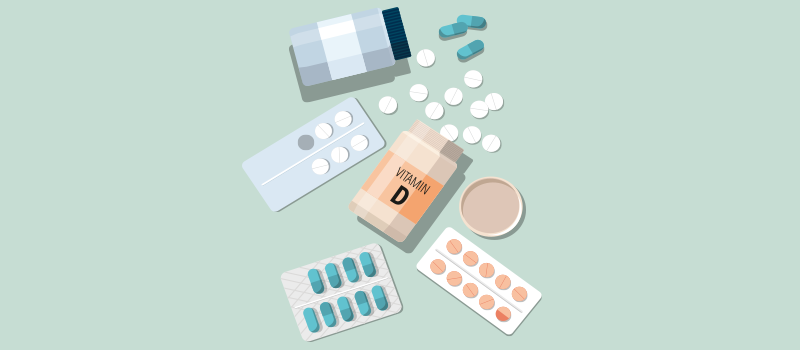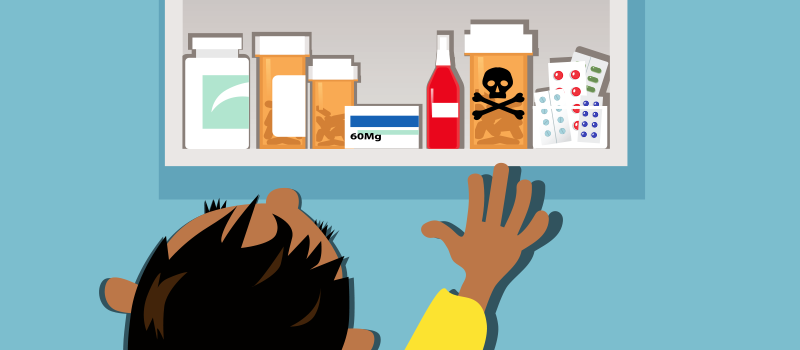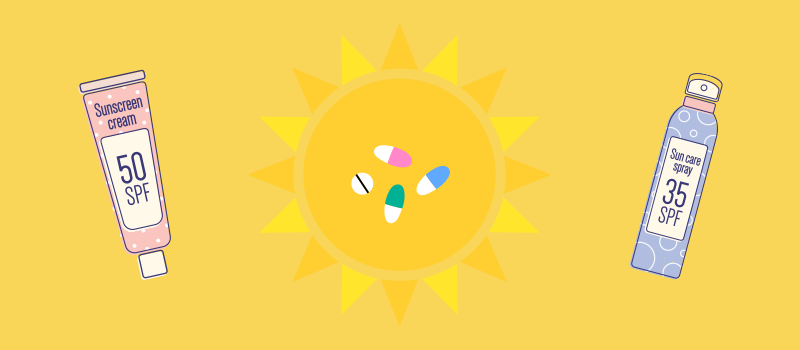What’s the Buzz
The Bee Healthy Blog
Prescription Vitamin D vs. Over the Counter

Vitamin D is an essential nutrient for good bone health and a healthy immune system—it’s important to make sure that you’re getting a sufficient amount. This supplement is one of the most commonly filled prescription vitamins at the pharmacy with many over-the-counter (OTC) purchases as well. Vitamin D became even more “popular” this past year during the COVID-19 pandemic when it was cited as an essential immune-boosting supplement by many healthcare providers. If you’re considering taking vitamin D, first talk to your doctor to determine what type, form, and dosage is right for you.
What is Vitamin D?
Vitamin D is a fat-soluble vitamin that has many vital functions in the body, including bone development and bone health[1]. It can be found naturally in foods such as fatty fish like salmon and tuna, and vitamin D-fortified products including milk, cereals, and orange juice. It is often referred to as the “sunshine vitamin” because direct exposure to sunlight produces vitamin D from cholesterol[2]. However, this is not a reliable source of vitamin D due to increased risks of skin cancer. In addition to seasonal change, winter months offer even less sunlight, especially in the northeastern states. Keep in mind that the amount of sunlight needed will vary from person to person depending on their age, ethnicity, and underlying health status.
Vitamin D3 vs. D2
The main difference between vitamin D2 (ergocalciferol) and D3 (cholecalciferol) is the source: D2 is plant-based and D3 is animal-derived. Upon consumption, D2 is converted to D3 by the liver – the natural form of vitamin D in the body. By bypassing that conversion step, vitamin D3 raises the serum levels more effectively. For that reason, D3 is usually recommended, but there is not a huge difference, and both offer the same benefits. What’s more important is taking the supplement consistently; the best way to maintain the blood vitamin D level is to take it year-round. Vitamin D is best absorbed when taken after a meal but may be taken with or without food. Check with your pharmacist or read the label carefully to choose the products most suitable for your lifestyle and dietary preference.
Over the Counter vs. Prescription Strength Vitamin D
OTC vitamin D strengths range from 400 IU (international units) to 2000 IU. Dosing of OTC vitamin D supplements varies, depending on a person’s dietary intake, underlying conditions, and whether it is used as a dietary supplement or treatment of vitamin D deficiency.
Vitamin D softgels, tablets, and drops are available without a prescription. Liquid vitamin D is usually used for babies and adults with swallowing difficulty. There are no significant differences between vitamin D softgels vs. tablets except that softgels are more comfortable to swallow, and it tends to mask the chalky taste better than the pills.
Vitamin D2 50,000 units requires a prescription, however, vitamin D3 50,000 units does not require one. Although vitamin D3 50,000 units does not require a prescription, it may only be accessible by the pharmacy staff behind the counter.
Vitamin D Deficiency
In the United States, the prevalence of vitamin D deficiency is highest in people who are elderly, obese, nursing home residents, and hospitalized. A study found that about 50-60% of nursing home residents and hospitalized patients had vitamin D deficiency[3]. Researchers have also found a correlation between vitamin D deficiency and a higher risk of COVID-19—in a recent study, more than 80 percent of people with COVID-19 didn’t have adequate levels of the “sunshine vitamin” in their blood[4]. In addition, people with darker skin are more likely to be vitamin D deficient because melanin, which causes skin pigmentation, lowers the skin's ability to make vitamin D in response to sunlight exposure.
Who Needs Prescription-Strength Vitamin D?
Most people do not need prescription vitamin D; in most cases, it is prescribed for patients with certain health conditions such as chronic kidney or liver disease. If your doctor recommends taking vitamin D supplements, you can still request a prescription even if it’s OTC-strength. You may be able to save money through insurance or with our free Prescription Discount Card.
It's important to take the right dosage of vitamin D, as too much can lead to kidney stones and other serious side effects. Talk to your doctor to verify if you’re getting an adequate amount, and ask if they would recommend vitamin D supplements or what other recommendations they might make to ensure a balanced, nutritious diet.
References:
[1] https://ods.od.nih.gov/factsheets/Vitamind-HealthProfessional/
[2] https://www.ncbi.nlm.nih.gov/pmc/articles/PMC3356951/
[3] https://www.ncbi.nlm.nih.gov/books/NBK532266/
[4] https://jamanetwork.com/journals/jamanetworkopen/fullarticle/2770157











SOCIAL